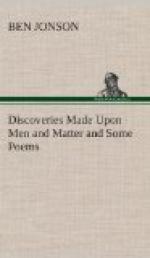But how differs a Poem from what we call Poesy?
Poesis.—Artium regina.—Poet. differentiae.—Grammatic.—Logic.— Rhetoric.—Ethica.—A poem, as I have told you, is the work of the poet; the end and fruit of his labour and study. Poesy is his skill or craft of making; the very fiction itself, the reason or form of the work. And these three voices differ, as the thing done, the doing, and the doer; the thing feigned, the feigning, and the feigner; so the poem, the poesy, and the poet. Now the poesy is the habit or the art; nay, rather the queen of arts, which had her original from heaven, received thence from the Hebrews, and had in prime estimation with the Greeks transmitted to the Latins and all nations that professed civility. The study of it (if we will trust Aristotle) offers to mankind a certain rule and pattern of living well and happily, disposing us to all civil offices of society. If we will believe Tully, it nourisheth and instructeth our youth, delights our age, adorns our prosperity, comforts our adversity, entertains us at home, keeps us company abroad, travels with us, watches, divides the times of our earnest and sports, shares in our country recesses and recreations; insomuch as the wisest and best learned have thought her the absolute mistress of manners and nearest of kin to virtue. And whereas they entitle philosophy to be a rigid and austere poesy, they have, on the contrary, styled poesy a dulcet and gentle philosophy, which leads on and guides us by the hand to action with a ravishing delight and incredible sweetness. But before we handle the kinds of poems, with their special differences, or make court to the art itself, as a mistress, I would lead you to the knowledge of our poet by a perfect information what he is or should be by nature, by exercise, by imitation, by study, and so bring him down through the disciplines of grammar, logic, rhetoric, and the ethics, adding somewhat out of all, peculiar to himself, and worthy of your admittance or reception.
1. Ingenium.—Seneca.—Plato.&
mdash;Aristotle.—Helicon.—Pegasus.—
Parnassus.—Ovid.—First, we require
in our poet or maker (for that title our language
affords him elegantly with the Greek) a goodness of
natural wit. For whereas all other arts consist
of doctrine and precepts, the poet must be able by
nature and instinct to pour out the treasure of his
mind, and as Seneca saith, Aliquando secundum Anacreontem
insanire jucundum esse; by which he understands the
poetical rapture. And according to that of Plato,
Frustra poeticas fores sui compos pulsavit.
And of Aristotle, Nullum magnum ingenium sine mixtura
dementiae fuit. Nec potest grande aliquid, et
supra caeteros loqui, nisi mota mens. Then it
riseth higher, as by a divine instinct, when it contemns
common and known conceptions. It utters somewhat
above a mortal mouth. Then it gets aloft and
flies away with his rider, whither before it was doubtful
to ascend. This the poets understood by their
Helicon, Pegasus, or Parnassus; and this made Ovid
to boast,




